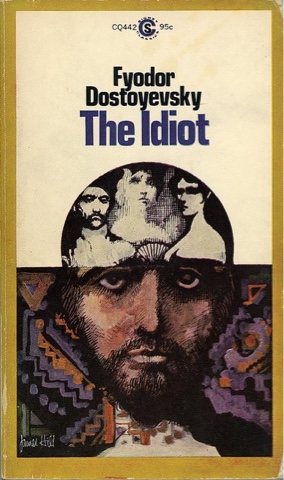Lev The Idiot: A Literary and Personal Reflection
 Dostoevsky wrote some very fine stories, exploring life in the tumultuous religious and political world of 19th-century Russia. "Crime and Punishment" takes a sympathetic view of a murderer who carried out the deed with a sense of ethical justification, only to suffer an overwhelming sense of guilt. "The Brothers Karamazov" is a theological and political drama spurred by patricide and hedonistic characters. "Notes from Underground" inspires many with the notion that there is an underground, a world inhabited by isolated free-thinking existentialists. But my favourite is the polyphonic novel, "The Idiot"; not on account that the protagonist and I share the same first name, but more that we share a similar ethos.
Dostoevsky wrote some very fine stories, exploring life in the tumultuous religious and political world of 19th-century Russia. "Crime and Punishment" takes a sympathetic view of a murderer who carried out the deed with a sense of ethical justification, only to suffer an overwhelming sense of guilt. "The Brothers Karamazov" is a theological and political drama spurred by patricide and hedonistic characters. "Notes from Underground" inspires many with the notion that there is an underground, a world inhabited by isolated free-thinking existentialists. But my favourite is the polyphonic novel, "The Idiot"; not on account that the protagonist and I share the same first name, but more that we share a similar ethos.
Thematically, the story involves the challenge of a character who strives toward being an ethical person, in the Christian model, whilst encountering those who are far more interested in material gain, domination in their relationships, and hedonism in their lifestyle. Whilst Lev is open about his own life and ethical motivations, those that he encounters connive to take advantage of him, and they do so with apparent ease. Nearly every character in the novel, including the women who claim to love him, refer to him as "the idiot" for his seemingly naive innocence in a cut-throat social world.
In reality, Lev is not naive or innocent. He has quite a deep insight into the motives and behaviours of those around him but chooses not to engage on their level, but rather continues to promote his ethical position without judgment, but with radiant friendliness, honesty, and a far greater depth of character to those who he is surrounded by. Such leadership is influential; even as others treat him with disdain, his voice becomes increasingly present in the internal dialogue of the other characters. In an environment where others pay lip service to their supposed faith and morality, he practices it with humility and consistency and thus becomes a shared conscience among other characters. Despite this, the novel accelerates to a clash of perspectives between the guileless and the manipulative, including betrayal and murder (this seems to be so common with Dostoevsky) with a stunning conclusion.
Whilst I do not share the identical religious conviction at the character in the novel, there is much about their sense of reverence and wonder with the natural world with which I feel, through pantheism, with a great affinity. Like this character, I have little time for social competition, petty cliques, status climbers, and so forth; there are far more important issues in the world than the machinations of being the supposed centre of a social group. In my engagements with others, albeit sometimes imperfectly, I try to give priority to kindness and generosity. This can come with a cost; I remember very clearly a former partner once gave me a very sympathetic hug as she said "People will exploit you". The palpable irony and probable projection of that event did not go unnoticed.
This is perhaps the key point; it does not go unnoticed. Like Dostoevsky's character, I have a ready tendency to forgive people for their failings, but I do not forget. After all, people with adult reasoning should know what the right thing to do is. Of course, people can be thoroughly deserving of forgiveness when they recognise the error of their ways and change their behaviour; we are all imperfect. In many cases, however, past behaviour is the best predictor of future behaviour. When kindness is repeatedly abused, when generosity is exploited, when one is lied to (that includes breaking commitments and future faking), subject to larceny (including those who borrow money and make no effort to pay it back), then forgiveness reaches a limit; it is necessary to have a hard head to go with a soft heart, and certainly better than having it the other way around. Whilst the manipulative and exploitative may gain short-term gain they lose the long-term benefits; I will thank them for their time, and simply walk away. Over time this means that people will increasingly find themselves surrounded by those of the same ethos and convictions.
For what it's worth, Dostoevsky named the character with Lev Tolstoy in mind when writing "The Idiot", using his title, name, surname (as assumed personality), and genuine religious conviction for the protagonist. It is certainly not without reason that I find Tolstoy's "How Much Land Does A Man Need?" to be the greatest short story I have read, and the Christian anarchism expressed in "The Kingdom of God Is Within You" to be highly motivating. Perhaps, in the future, I will offer reflections on how those two texts influenced my own sense of political economy and political norms. For now, it is simply worth noting that whilst Lev might come across as an idiot who is an easy mark for exploitation you are almost certainly overestimating your own insight if you really think that is the case; he is giving you enough rope to hang yourself.
- lev.lafayette's blog
- Log in to post comments

